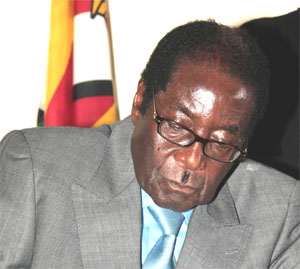


 Zimbabwe’s President Robert Mugabe is due to sign into law a constitutional amendment allowing his rival Morgan Tsvangirai to become prime minister.
Zimbabwe’s President Robert Mugabe is due to sign into law a constitutional amendment allowing his rival Morgan Tsvangirai to become prime minister.
The signing of the bill will bring a power-sharing unity government in Zimbabwe one step closer.
The deal between the two men’s parties was agreed in September 2008 – but has been mired by bitter disputes.
Mr Tsvangirai is due to be sworn in next Wednesday, 11 February, with Mr Mugabe remaining as president.
Last week, Southern African leaders, who have been mediating the deal, persuaded Mr Tsvangirai’s Movement for Democratic Change (MDC) to join a joint administration despite their concerns over Zanu-PF’s commitment to sharing power.
The unity government is intended to ease Zimbabwe’s economic meltdown but correspondents say this is largely dependent on the restoration of foreign aid and investment.
Donors say they will only resume aid when the government is working properly and they see powers are being shared.
There are still some issues to be resolved, including the demand by the MDC that opposition supporters and activists be released from detention.
Investors invited
Zimbabwe’s parliament unanimously approved the constitutional amendment – in a rare show of unity – on Thursday.
The chief whip of the main faction of the opposition MDC, Innocent Gonese, said the party had no choice.
“If you look at the state of our economy, if you look at the suffering of our people, I think this was the only way to go,” he told the BBC’s Network Africa programme.
“But I believe that this is just a beginning. Obviously there are going to be some difficulties ahead, but I think that if we all put Zimbabwe first, before we put our heads together, I believe that we can overcome all the difficulties.”
Zimbabwe’s Deputy Information Minister Bright Matonga called for investors to return.
“We will respect property rights; we will respect the issue of declaration and repatriation of dividends,” he said.
“So really we are inviting people in manufacturing, in tourism, in farming, in mining.”
Many investors have pulled out of Zimbabwe over the government’s seizure of white-owned farms since 2000.
Sorry. No data so far.

